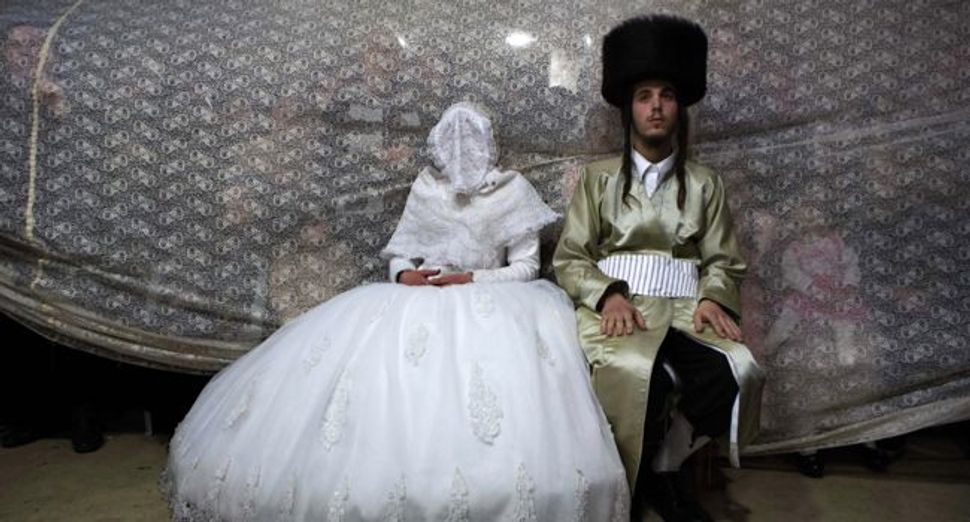Ultra-Orthodox Jews Shouldn’t Have a Monopoly on Tradition

Old World: Jewish bride Rivka Hannah (Hofman) sits next to her groom Aharon Krois during the Mitzvah Tans dance ritual following their wedding in an ultra-orthodox neighborhood of Jerusalem on February 18. Image by Getty Images
Avi Shafran is unhappy with the term “ultra-Orthodox.” I am too.
Both as a sociologist and as someone who identifies himself as an Orthodox Jew, I too find the message implied by the term “ultra-Orthodox” false, but for different reasons. The people who have been so identified are not “more” Orthodox, nor are they necessarily answering to a higher authority. Jews who are often labelled ultra-Orthodox, as anyone who has studied the Orthodox as I have knows, simply choose to believe that they somehow are truer in their beliefs and practices than others, and they claim to be true to the ways of the past.
But any historian of Jewry can easily show that many of the beliefs and behaviors such claimants hold to are quite different from those of generations past. Whether it is the belief, for example, that water must be certified kosher — something none of those grandmothers or grandfathers whom Shafran claims are the group with which he identifies, ever held to, or whether it is the notion that Orthodox Jews always shunned popular culture. Hasidic rebbes were, for example, among the crowds who streamed to Marienbad, Karlsbad and the other spas and baths of Europe for the cure, so much a part of popular culture in pre-Holocaust Europe.
The real difference between those who have been called ultra-Orthodox for want of a better-known label and other self-identified Orthodox Jews has nothing to do with a “fealty to the Judaism of the ages,” as Shafran suggests. The difference is in the claim by people like Shafran that what they have chosen to believe and the way they have chosen to act is in absolute fealty to the Judaism of the ages. It is in the assertion some Orthodox Jews make to be the true guardians of the tradition.
Orthodoxy has changed and, like other forms of religion, it is today a matter of choice. Some Orthodox choose to claim that the beliefs and communal standards they observe are the only true tradition and to insist that this tradition is unchanged from the past and threatened by contemporary general culture, from which they believe it and they must be insulated. Other Orthodox Jews also hold fast to beliefs and communal standards anchored in the Torah but realize that all these have evolved and changed over time, and they believe this is because Jews have always stood with a foot in more than one culture. The former are “haredim,” those who tremble and are anxious about the encounter with the world outside their own Jewish one, for fear it will seduce and undermine Jewish continuity. The latter believe Judaism can meet and successfully encounter a culture outside itself and be strengthened rather than undermined by the contact; they also have the right to be called Orthodox.
Neither is more or less Orthodox than the other; neither is ultra nor inferior. They are just different choices.
Samuel Heilman is a professor of sociology at Queens College of the City University of New York.














